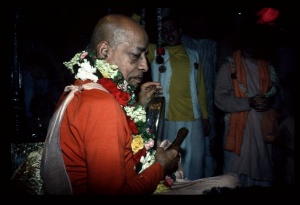SB 11.21.8

A.C. Bhaktivedanta Swami Prabhupada
Please note: The synonyms, translation and purport of this verse were composed by disciples of Śrīla Prabhupāda
TEXT 8
- akṛṣṇa-sāro deśānām
- abrahmaṇyo 'sucir bhavet
- kṛṣṇa-sāro 'py asauvīra-
- kīkaṭāsaṁskṛteriṇam
SYNONYMS
akṛṣṇa-sāraḥ — without spotted antelopes; deśānām — among places; abrahmaṇyaḥ — where there is no devotion to the brāhmaṇas; aśuciḥ — contaminated; bhavet — is; kṛṣṇa-sāraḥ — possessing spotted antelopes; api — even; asauvīra — without saintly cultured men; kīkaṭa — (a place of low-class men, such as) the state of Gayā; asaṁskṛta — where people do not practice cleanliness or purificatory ceremonies; īraṇam — where the land is barren.
Translation and purport composed by disciples of Śrīla Prabhupāda
TRANSLATION
Among places, those bereft of the spotted antelope, those devoid of devotion to the brāhmaṇas, those possessing spotted antelopes but bereft of respectable men, provinces like Kīkaṭa and places where cleanliness and purificatory rites are neglected, where meat-eaters are prominent or where the earth is barren, are all considered to be contaminated lands.
PURPORT
The word kṛṣṇa-sāra refers to the spotted antelope, whose hide is used by brahmacārīs while residing in the āśrama of the spiritual master. Brahmacārīs never hunt in the forest, but rather accept skins from those animals already deceased. The skin of the black or spotted antelope is also used as a garment by those receiving instruction in the execution of Vedic sacrifice. Therefore, since sacrifice cannot be properly performed in areas bereft of such creatures, these places are impure. Furthermore, although the inhabitants of a particular place may be expert in performing fruitive activities and ritualistic sacrifices, if they are inimical to the devotional service of the Lord, such a place is also polluted. Śrīla Bhaktisiddhānta Sarasvatī Ṭhākura explains that previously the provinces of Bihar and Bengal were bereft of devotional service to the Lord and were considered impure. Then great Vaiṣṇavas such as Jayadeva appeared in these territories, converting them into holy places.
The word asauvīra indicates those places without suvīras, respectable saintly persons. Ordinarily, a person who obeys the state laws is considered a respectable citizen. In the same way, one who strictly obeys the law of God is considered to be a cultured or decent man, suvīra. The place where such intelligent persons reside is called sauvīram. Kīkaṭa refers to the modern state of Bihar, which traditionally has been known as a territory of uncivilized men. Even in such provinces, however, any place where saintly persons gather is considered to be holy. On the other hand, a province of generally respectable persons is immediately polluted by the presence of sinful men. Asaṁskṛta indicates lack of external cleanliness, as well as the absence of purificatory ceremonies for internal cleanliness. Śrīla Madhvācārya quotes from the Skanda Purāṇa as follows: "Religious persons should reside within an eight-mile radius of rivers, oceans, mountains, hermitages, forests, spiritual cities or places where the śālagrāma-śīlā is found. All other places should be considered kīkaṭa, or contaminated. But if even in such contaminated places black and spotted antelopes are found, one may reside there as long as sinful persons are not also present. Even if sinful persons are present, if the civil power rests with respectable authorities, one may remain. Similarly, one may dwell wherever the Deity of Viṣṇu is duly installed and worshiped."
The Lord here elaborates upon the theme of piety and sin, which are based on purity and impurity. Thus pure and contaminated places of residence are described here.